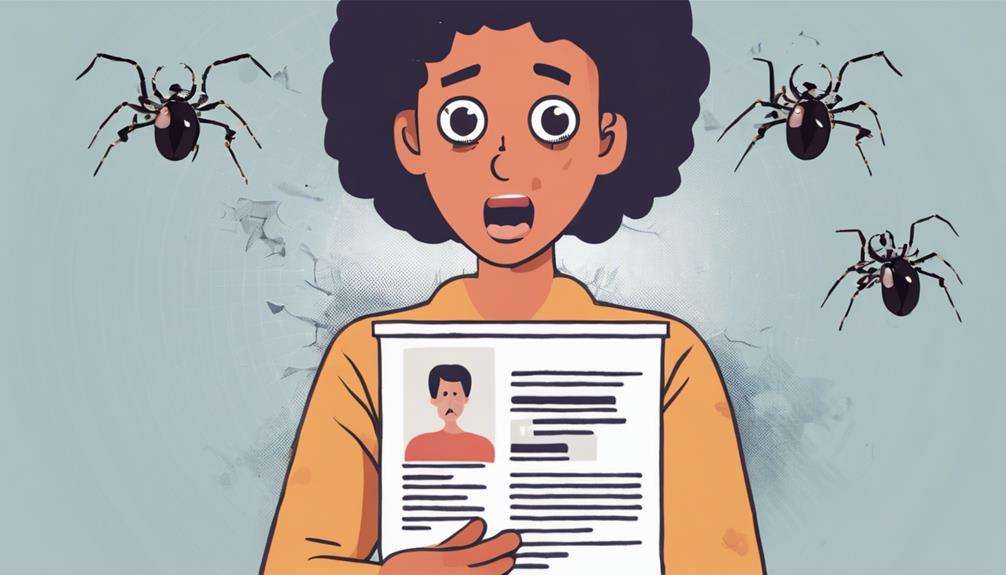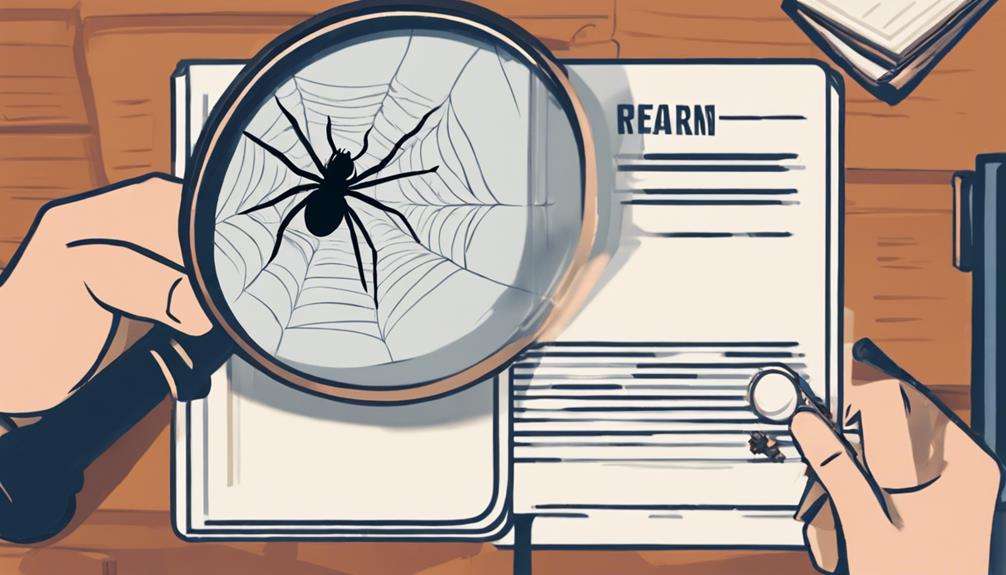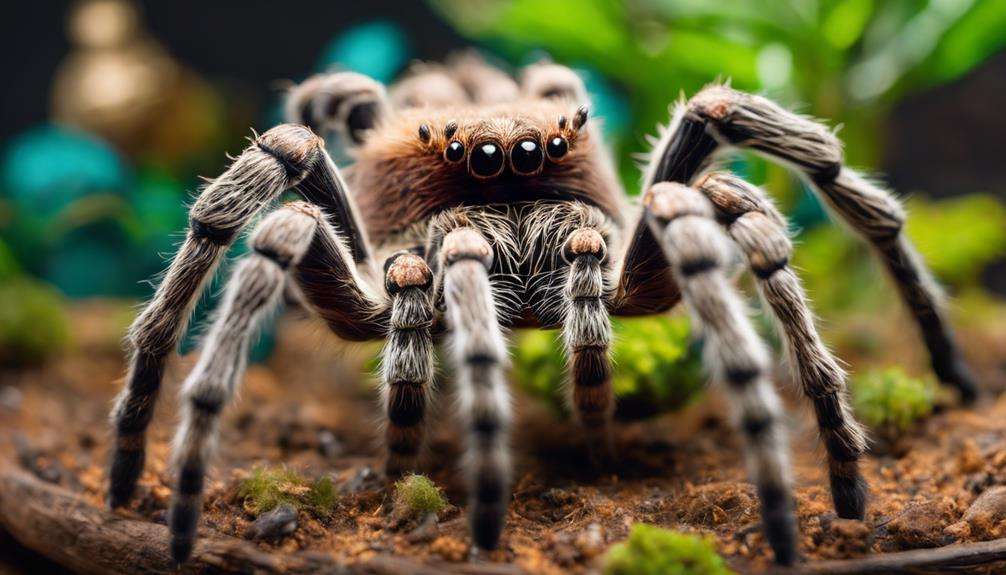If you're pondering the legalities of owning pet spiders, the scene can be labyrinthine with laws that vary from place to place. Before acquiring a spider as a pet, it's paramount to comprehend the regulations that govern spider ownership.
From species-specific restrictions to liability concerns, exploring the legal terrain of pet spider ownership demands careful consideration and adherence to the law. Let's decipher the web of legal intricacies surrounding these eight-legged companions and the responsibilities that come with having them in your care.
Key Takeaways
- Research legal restrictions and obtain necessary permits before acquiring a pet spider.
- Understand and comply with zoning laws to avoid fines or legal repercussions.
- Be aware of species-specific regulations and state laws governing spider ownership.
- Evaluate insurance coverage for liability and consider additional policies for exotic pet ownership.
Legal Restrictions on Spider Ownership
Before acquiring a pet spider, it's imperative to thoroughly research and understand the legal restrictions that govern spider ownership in your area. Some cities and states have bans or restrictions on owning certain species of spiders, particularly exotic or venomous animals. The legal regulations surrounding spider ownership can vary based on the type of spider and its potential threat to public safety.
In certain cases, permits or licenses may be required for owning specific exotic or venomous spider species. It's essential to abide by these regulations, as violating spider ownership laws can lead to fines, penalties, or even confiscation of the spider. Hence, before bringing home a pet spider, it's essential to familiarize yourself with and comply with the local laws and regulations concerning the ownership of these fascinating creatures.
Permit Requirements for Pet Spiders
Researching the specific permit requirements for owning pet spiders in your state is important to guarantee compliance with the law and responsible ownership. Some states mandate permits for owning pet spiders, particularly for exotic species or those deemed dangerous. These permit requirements are put in place to regulate spider ownership and make sure the safety of both the spider and the community.
The regulations surrounding permit requirements for pet spiders vary by state, with some states having more stringent rules than others. Failure to obtain the necessary permits for pet spiders can lead to fines or legal consequences, highlighting the importance of adhering to state regulations. By obtaining the required permits, you demonstrate your commitment to responsible ownership and contribute to the overall welfare of the spider and those around you.
Hence, it's important to familiarize yourself with the permit requirements for pet spiders in your area to avoid any legal issues and maintain a safe environment for your arachnid companion.
Zoning Laws and Pet Spiders

Understanding the zoning laws that govern pet spider ownership is essential to guarantee compliance with local regulations and avoid potential legal ramifications. Zoning laws play a vital role in determining whether you can legally keep a pet spider in your residence. These laws may impose restrictions on the ownership of pet spiders in certain areas based on specific local regulations.
Some cities or towns may have ordinances in place that prohibit or limit the keeping of pet spiders due to safety concerns or other reasons. In addition, homeowners' associations often have their own set of rules regarding pet ownership, including regulations related to pet spiders.
Violating zoning laws concerning pet spiders can lead to fines or other legal consequences. To make sure that you're in compliance with the relevant zoning laws, it's imperative to research and understand the regulations in your area before acquiring a pet spider. By taking the time to familiarize yourself with these laws, you can avoid potential conflicts and enjoy owning a pet spider within the boundaries of the law.
Species-Specific Regulations for Spiders
When considering owning pet spiders, you should be aware of state-specific laws that regulate certain spider species for public safety reasons. These regulations may include requirements for breeding permits and restrictions on importing venomous spiders like black widows and brown recluses.
Understanding and adhering to these species-specific regulations is important to avoid any legal complications associated with owning pet spiders in your area.
State-Specific Spider Laws
Do state-specific laws regulate the ownership of certain spider species in the United States?
Before acquiring a spider as a pet, it's important to be aware of the local laws governing their ownership. Some states, like California and Illinois, have restrictions against keeping tarantulas and other dangerous or exotic spider species.
For instance, California prohibits the possession of certain spider species post-January 1992, emphasizing public safety and animal welfare. Arizona mandates a wildlife holding license for restricted spider species, such as tarantulas, ensuring proper management and care.
States like Maine and Iowa also enforce permits and prohibitions on owning specific wild or venomous arachnid species, highlighting the importance of responsible pet ownership and safety measures. It's essential to comply with these regulations to guarantee the well-being of both the spiders and the community.
Breeding Permit Requirements
Before acquiring a spider as a pet, it's essential to be aware of breeding permit requirements for certain spider species to guarantee responsible breeding practices and population control.
Some regions have specific regulations governing the breeding of spiders to make sure population control and prevent ecological impacts. Breeding permits are vital for monitoring and managing the population of specific spider species, preventing overpopulation and genetic issues.
Failure to obtain a breeding permit in regulated areas can lead to fines or legal consequences for violating breeding regulations. By adhering to breeding permit requirements, breeders contribute to the conservation and sustainability of spider populations in controlled environments.
It's important to understand and follow these regulations to help maintain a balanced spider population and preserve their natural habitats.
Importation Restrictions for Spiders
To maintain compliance with species-specific regulations for spiders, it's key to understand and adhere to importation restrictions imposed by different countries. Some countries have strict importation restrictions on specific spider species to prevent the introduction of invasive species, which can have significant ecological impacts.
Certain spider species may be prohibited from importation due to their venomous nature or potential to disrupt local ecosystems. Importation regulations for spiders vary by country and may necessitate permits or documentation for legal entry.
Non-compliance with importation restrictions can result in confiscation of the spiders, fines, or other legal consequences. Therefore, it's essential to thoroughly research and follow importation regulations when acquiring spider species from other countries to avoid any potential legal issues.
Liability Issues for Spider Owners
As a spider owner, you should be aware that you can be held liable for any incidents involving your spider, such as bites or escapes. Proper containment measures, such as using secure enclosures, are essential to prevent liability issues.
Transparent communication with authorities and neighbors can also help avoid misunderstandings and legal troubles.
Owner Responsibility for Bites
Spider owners can be held liable for damages resulting from their spiders biting someone, with the extent of liability depending on the specific circumstances of the incident. Liability issues can involve compensating the victim for medical expenses and other damages incurred as a result of the spider bite. The responsibility to provide compensation is essential in such cases, and owners need to be aware of their legal obligations.
Understanding the potential financial implications of a spider bite and the need to cover medical costs and other related expenses is critical. It's advisable for spider owners to review their insurance coverage to determine if such incidents are included. Being proactive in addressing liability concerns can help mitigate risks and ensure appropriate protection in case of lawsuits.
Insurance Coverage for Spiders
Considering the potential risks associated with owning pet spiders, it's imperative for owners to evaluate their insurance coverage thoroughly to ascertain the extent of liability protection available.
Some homeowners insurance policies may offer liability coverage for pet spiders, but the inclusion and extent of this coverage can vary depending on the provider and specific policy. Liability coverage can be essential for protecting owners from potential legal claims in case their spider causes harm or damage.
It's essential for pet spider owners to carefully review their insurance policies to determine if liability coverage extends to exotic pets like spiders. Moreover, understanding the terms and conditions of the insurance policy is crucial, as coverage for pet spiders may be limited or excluded in some cases, necessitating the exploration of alternative insurance options such as specific exotic pet insurance.
Import and Export Regulations for Spiders

Import and export regulations for spiders vary greatly across countries, with tarantulas often requiring permits to guarantee compliance with conservation laws and prevent illegal wildlife trade. These regulations aim to protect the species and prevent their exploitation for commercial purposes.
When importing or exporting tarantulas, it's essential to adhere to the specific requirements of each country to avoid legal issues. Documentation and inspections may be necessary when transporting these animals across international borders to make sure they aren't being illegally traded. Violating the import and export regulations for tarantulas can lead to severe consequences, such as fines, confiscation of the animals, and legal implications.
Before engaging in any trade involving tarantulas, thorough research on the regulations governing the import and export of these species is essential. By following the established guidelines and obtaining the necessary permits, individuals can contribute to the conservation efforts aimed at protecting these fascinating creatures.
Health and Safety Standards for Pet Spiders
Maintaining proper health and safety standards for your first pet spider is important for ensuring their well-being and longevity. Proper handling techniques play a critical role in preventing bites and injuries during interactions with your spider.
Regularly cleaning your spider's enclosure is essential to maintain a hygienic environment and minimize the risk of health issues. Ensuring your pet spider receives a suitable diet based on their species and size is essential for their overall health and longevity.
Understanding and meeting the specific temperature and humidity requirements of your spider species are important for their health and comfort. It's also important to be knowledgeable about common health issues that can affect pet spiders, such as mites or infections, to facilitate early detection and prompt treatment.
Insurance Considerations for Spider Ownership

When owning a pet spider, it's important to assess the insurance implications related to potential risks and coverage considerations. As exotic pets, pet spiders can sometimes be viewed as a liability by insurance companies due to the associated risks of bites or escapes. Homeowner's insurance policies may contain exclusions or restrictions regarding owning exotic pets like spiders.
It's important to carefully review your insurance policies to fully understand the coverage available for potential incidents involving pet spiders. Some insurance providers may require additional coverage or disclosures specifically for owning exotic pets like spiders. Failing to disclose pet spider ownership to your insurance company could lead to claim denials or even policy cancellations.
To make sure that you're adequately protected, it's advisable to communicate openly with your insurance provider about your pet spider and any necessary adjustments to your coverage.
Endangered Species and Pet Spider Ownership
Considering the legal restrictions surrounding endangered species, it's imperative to thoroughly research and adhere to regulations when contemplating pet spider ownership, particularly tarantulas. Owning endangered species as pets is prohibited under the Endangered Species Act in the United States.
The Convention on International Trade in Endangered Species (CITES) plays a vital role in regulating the international trade of endangered species, including certain tarantula species. Tarantula species listed under CITES Appendix I are highly endangered and are strictly prohibited for private ownership. Violating laws related to endangered species can result in severe penalties, such as fines and imprisonment.
Hence, it's essential to understand and ensure compliance with regulations when considering owning pet tarantulas to avoid any involvement with endangered species. By being aware of the laws and regulations surrounding endangered species, you can responsibly enjoy the companionship of pet spiders while also contributing to the conservation of these creatures.
Legal Resources for Spider Owners

Exploring legal resources for spider owners reveals essential guidelines and regulations to guarantee compliance with ownership laws and regulations. When considering owning pet spiders, it's important to understand that regulations regarding spider ownership can vary greatly between states in the US. Some states may require permits or licenses for specific spider species, while certain cities and towns may have outright bans on owning certain types of spiders. So, before acquiring a pet spider, it's imperative to carefully research and adhere to local laws to avoid potential legal consequences.
It is essential to emphasize the significance of complying with these regulations, as violating spider ownership laws can result in fines or other legal repercussions. In addition, it isn't only local laws that spider owners need to be aware of; international laws also exist, such as in countries like Singapore, where fines can be imposed for keeping certain spider species without the necessary permits. Educating oneself about the legalities surrounding pet spider ownership is paramount to ensuring responsible ownership and avoiding any legal entanglements.
Frequently Asked Questions
Is It OK to Have a Pet Spider?
Having a pet spider is a personal choice that involves an ethics debate, psychological effects, cultural perceptions, health concerns, and legal restrictions. Consider these aspects before deciding, ensuring responsible ownership and compliance with laws.
What All Do You Need for a Pet Spider?
To care for a pet spider, you need proper housing with ventilation, substrate, water source, hiding spots, and regular temperature/humidity checks. Feeding habits vary by species. Handle gently, watch for signs of illness, and respect their territorial and solitary behavioral traits.
What Spiders Are Safe to Have as Pets?
When considering pet spiders, choose safe species like Chilean rose tarantulas known for docility. Their low-maintenance care makes them beginner-friendly. Remember, handling techniques and understanding behaviors are key to a positive experience for both you and your spider.
Can You Keep a Common House Spider as a Pet?
Yes, you can keep a common house spider as a pet. Their behavior is fascinating, and with proper care like providing hiding spots and regular food, they thrive. Handling gently and engaging in enrichment activities can enhance your pet spider's well-being.
Conclusion
As you navigate the intricate web of legalities surrounding pet spider ownership, remember to tread carefully and weave your way through regulations with precision.
Just as a spider meticulously crafts its web, make sure that you adhere to laws and guidelines to protect both yourself and your arachnid companion.
By spinning a web of compliance and responsibility, you can enjoy the unique companionship of a pet spider without getting caught in a legal entanglement.






